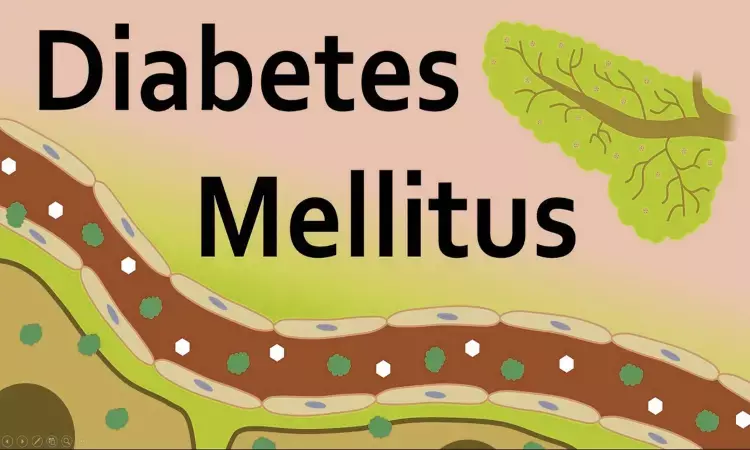- Home
- Medical news & Guidelines
- Anesthesiology
- Cardiology and CTVS
- Critical Care
- Dentistry
- Dermatology
- Diabetes and Endocrinology
- ENT
- Gastroenterology
- Medicine
- Nephrology
- Neurology
- Obstretics-Gynaecology
- Oncology
- Ophthalmology
- Orthopaedics
- Pediatrics-Neonatology
- Psychiatry
- Pulmonology
- Radiology
- Surgery
- Urology
- Laboratory Medicine
- Diet
- Nursing
- Paramedical
- Physiotherapy
- Health news
- Fact Check
- Bone Health Fact Check
- Brain Health Fact Check
- Cancer Related Fact Check
- Child Care Fact Check
- Dental and oral health fact check
- Diabetes and metabolic health fact check
- Diet and Nutrition Fact Check
- Eye and ENT Care Fact Check
- Fitness fact check
- Gut health fact check
- Heart health fact check
- Kidney health fact check
- Medical education fact check
- Men's health fact check
- Respiratory fact check
- Skin and hair care fact check
- Vaccine and Immunization fact check
- Women's health fact check
- AYUSH
- State News
- Andaman and Nicobar Islands
- Andhra Pradesh
- Arunachal Pradesh
- Assam
- Bihar
- Chandigarh
- Chattisgarh
- Dadra and Nagar Haveli
- Daman and Diu
- Delhi
- Goa
- Gujarat
- Haryana
- Himachal Pradesh
- Jammu & Kashmir
- Jharkhand
- Karnataka
- Kerala
- Ladakh
- Lakshadweep
- Madhya Pradesh
- Maharashtra
- Manipur
- Meghalaya
- Mizoram
- Nagaland
- Odisha
- Puducherry
- Punjab
- Rajasthan
- Sikkim
- Tamil Nadu
- Telangana
- Tripura
- Uttar Pradesh
- Uttrakhand
- West Bengal
- Medical Education
- Industry
Use of anti-depressants linked to increased risk of type 2 DM

Antidepressant use is associated with the risk of diabetes onset in a time- and dose-dependent manner according to a new study. Therefore HbA1c level should be regularly monitored in patients taking antidepressants.
Japan: Antidepressant medication use has risen sharply over recent years. Recently, there have been concerns that antidepressants may adversely affect glucose metabolism, not least because some antidepressants induce significant weight gain, which may contribute to insulin resistance.
In view of this, researchers from Japan conducted a study to reveal the associations between the risk of new-onset type 2 diabetes mellitus and the duration of antidepressant use and the antidepressant dose, and between antidepressant use after diabetes onset and clinical outcomes. The study is published in the journal Diabetes Care.
Long-term antidepressant use showed to increased the risk of type 2 diabetes onset in a time- and dose-dependent manner whereas Glucose tolerance improved when antidepressants were discontinued or the dose was reduced after diabetes onset.
In this large-scale retrospective cohort study in Japan, new users of antidepressants (exposure group) and nonusers (non-exposure group), aged 20–79 years, were included between 1 April 2006 and 31 May 2015. Patients with a history of diabetes mellitus or receipt of antidiabetes treatment were excluded. Covariates were adjusted by using propensity score matching; the associations were analyzed between the risk of new-onset type 2 diabetes and the duration of antidepressant use/dose of antidepressant in the exposure and non-exposure groups by using Cox proportional hazards models. Changes in glycated hemoglobin (HbA1c) level were examined in groups with continuous use, discontinuation, or a reduction in the dose of antidepressants.
The results of the study are as follows,
1)Of 90,530 subjects, 45,265 were in both the exposure and the non-exposure group after propensity score matching; 5,225 patients developed diabetes.
2)Antidepressant use was associated with the risk of diabetes onset in a time- and dose-dependent manner.
3)The adjusted hazard ratio was 1.27 for short-term low-dose and 3.95 for long-term high-dose antidepressant use.
4)HbA1c levels were lower in patients who discontinued or reduced the dose of antidepressants.
"HbA1c level should be regularly monitored in patients taking antidepressants in order to inform the decision to reduce or discontinue antidepressant use, if possible when impaired glucose tolerance is observed," the authors concluded.
For further reading click on the following link,
MBBS
Dr K B AARTHI-has completed MBBS from SRM UNIVERSITY TAMIL NADU,Her interest is in the field of Pediatrics and Anaesthesia, also passionate in doing research and publishing articles.She joined Medical Dialogues in 2020 and publishes health news and medical updates. Email: editorial@medicaldialogues.in. Contact no. 011-43720751,9786713226
Dr Kamal Kant Kohli-MBBS, DTCD- a chest specialist with more than 30 years of practice and a flair for writing clinical articles, Dr Kamal Kant Kohli joined Medical Dialogues as a Chief Editor of Medical News. Besides writing articles, as an editor, he proofreads and verifies all the medical content published on Medical Dialogues including those coming from journals, studies,medical conferences,guidelines etc. Email: drkohli@medicaldialogues.in. Contact no. 011-43720751


